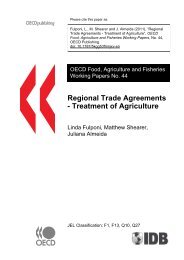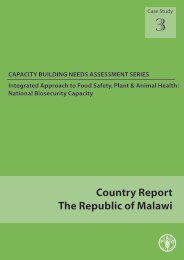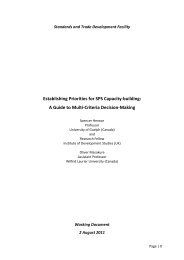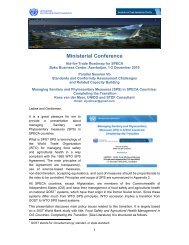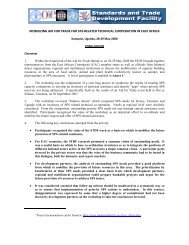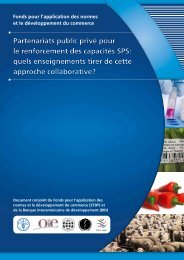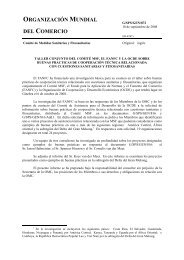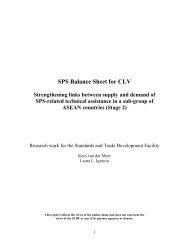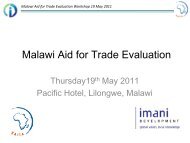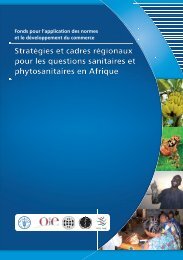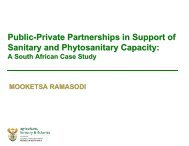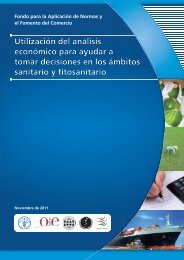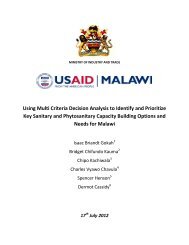Kenya - Standards and Trade Development Facility
Kenya - Standards and Trade Development Facility
Kenya - Standards and Trade Development Facility
You also want an ePaper? Increase the reach of your titles
YUMPU automatically turns print PDFs into web optimized ePapers that Google loves.
7. Plant healthStatus Needs Ongoing <strong>and</strong> planned assistance Recommended actions/gaps PriorityAwarenessThe “success story” of <strong>Kenya</strong>’sfresh produce industry <strong>and</strong> itsprivate-public partnership is amodel that many otherdev§eloping countries would liketo emulate, which illustrates howadopting food safety <strong>and</strong>agricultural health st<strong>and</strong>ards canserve as a catalyst for trade <strong>and</strong>competitiveness (WB).- Intensify efforts to buildpolitical, farmer <strong>and</strong> privatesector awareness of planthealth matters, GAP, <strong>and</strong> safeuse of pesticides throughregular awareness programs<strong>and</strong> training courses.- Increase stakeholderconsultation <strong>and</strong> participation(including private sector).1This success story creates goodawareness among farmers/privatesector, political, national <strong>and</strong> tosome extent regional levels whichas well contributes to theestablishment & recognition of<strong>Kenya</strong> Gap.Institutional <strong>and</strong> regulatory frameworkKEPHIS responsible to provide - Review of existing institutionsdependable, effective <strong>and</strong>for plant protectioncompetitive regulatory service for management <strong>and</strong> pesticidesensuring quality of agricultural control (including designationinputs <strong>and</strong> produce based on Plant of NPPO <strong>and</strong> cost recoveryProtection Act Chap 324; Seeds system)<strong>and</strong> Plant Varieties Act, Chap - <strong>Development</strong> of new plant326;. The service related to plant protection legislationhealth include:(including implementing- plant quarantine services for safe regulations) <strong>and</strong> improvemovement of plant materials; arrangements for pesticide- grading <strong>and</strong> inspection of registration.products for export <strong>and</strong> issuanceof phytosanitary certificate;- inspection of imported plantmaterials <strong>and</strong> checking ofphytosanitary certificates issued- EC – 10 th EDF (2008-2013, with onefocus on capacity building forcompanies <strong>and</strong> farmers on food safetyissues, including SPS)- Netherl<strong>and</strong>s (WSSD) – supporting theprivate sector, small holders for thedevelopment of horticulture <strong>and</strong>working with main partners KFC,FPEAK, KEPHIS, HCDA, & KARIthrough six different projects (Annex1).- FAO - supporting establishment ofphytosanitary control <strong>and</strong> surveillancesystem (possibly also includingrevision of legislation) (supported byNorway <strong>and</strong> UN fund) <strong>and</strong> addressingfruit fly infestation (regionalprogramme seeking funding).- USDA/USDA – PASA projectsincluding creation of phytosanitaryinformation system <strong>and</strong> addressingfruit fly infestation.- FAO: Management of Bactrocerainvadens <strong>and</strong> other target pests thatconstrain production <strong>and</strong> export offruits <strong>and</strong> vegetables in East Africa.- Also at regional level, STDF isfinancing a project creating an EasternAfrica Centre of PhytosanitaryExcellence including a pest riskanalysis (PRA) unit (implemented byCABI, KEPHIS <strong>and</strong> University ofNairobi <strong>and</strong> involving NPPOs ofneighbouring countries).The major outst<strong>and</strong>ing need include(WB)- Intensification of efforts to buildfarmers’ awareness of plantprotection <strong>and</strong> plant health mattersthrough regular awarenessprograms, especially for smallgrowers.- Institutionalization <strong>and</strong> preparationof manuals <strong>and</strong> guidelines for allaspects of export certification,development of computerized datamanagement system <strong>and</strong>information about the requirementsstated by main trading partners.- Enhancing & coordinating theongoing training programmes bydifferent institutions (KEPHIS,HCDA, FPEAK, etc.)- Streamlining regulations onagricultural inputs & seed <strong>and</strong>pesticide certification processes toregulate price & informal markets& reduce bureaucratic purchasingprocedures.- Updating the existing plant healthrelated regulation in line with SPS& IPPC requirements <strong>and</strong>streamlining to avoid possibleduplication, to enhance enforcementmechanisms & optimally utilize theavailable resources.111116



